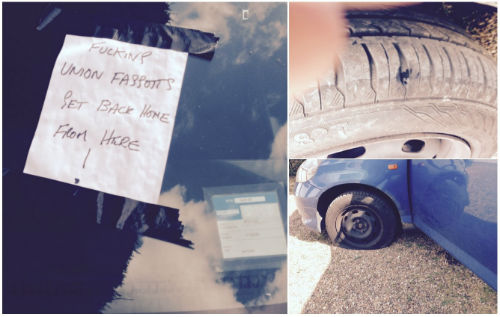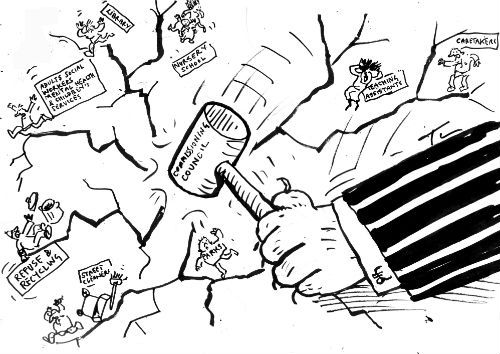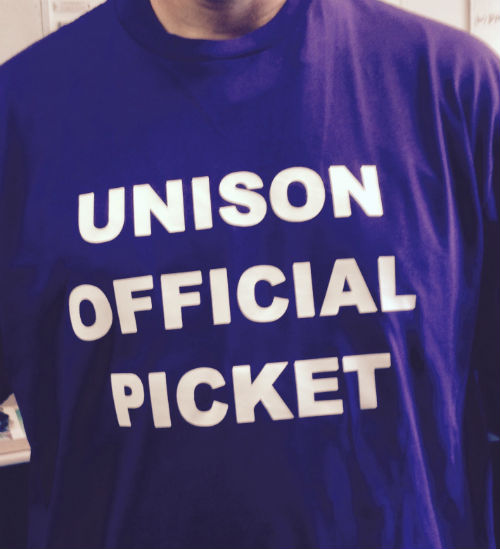
This briefing itemises anti-trade-union legislation since 1980. It then looks further back into history, and examines some of the key issues in Britain’s anti-union laws.
1980 Employment Act
· Definition of lawful picketing restricted to own place of work
· 80% ballot needed to legalise a closed shop
· Funds offered for union ballots
· Restricted right to take secondary action
· Code of practice (six pickets)
· Repeal of statutory recognition procedure
· Restricts unfair dismissal and maternity rights
· Unfair dismissal rights from 1 year to 6 months in companies under 20
1982 Employment Act
· Further restrictions on industrial action – eg. definition of trade dispute
· Further restricted action to ‘own’ employer
· Employers could obtain injunctions against unions and sue unions for damages
· 80% rule extended to ALL closed shops every 5 years
· Compensation for dismissal because of closed shop
· Removed union only labour clauses in commercial contracts
1984 Trade Union Act
· EC elections every 5 years by secret ballot
· Political fund ballots every 10 years
· Secret ballots before industrial action
1986 Public Order Act
· Introduced new criminal offences in relation to picketing
1988 Employment Act
· Unions to compensate members disciplined for non-compliance with majority decisions
· Members can seek injunction if no pre-strike ballot
· Union finances to be open to inspection#
· Unions prevented from paying members’ or officials’ fines
· Action to preserve post entry closed shop made unlawful
· New restrictions on industrial action and election ballots
· Ballots for separate workplaces
· Ballots for non-voting EC members
· Election addresses controlled
· Independent scrutiny
· Establishment of CROTUM (Commissioner for the Rights Of Trade Union Members)
1989 Employment Act
· Tribunal pre-hearing review and proposed deposit of £150
· Exemption of small employer from providing details of disciplinary procedures
· Restricts time off with pay for union duties
· Written reasons for dismissal now require 2 years’ service
· Redundancy rebates abolished
· Abolition of training commission
1990 Employment Act
· Attack on pre-entry closed shop – unlawful to refuse to employ non-union member
· All secondary action now unlawful
· Unions liable for action induced by ANY official unless written repudiation using statutory form of words sent to all members
· Selective dismissal of strikers taking unofficial action
· Extended power of CROTUM
1992 Trade Union & Labour Relations (Consolidation) Act
· Brings together all collective employment rights including trade union finances and elections; union members’ rights including dismissal, time off; redundancy consultation; ACAS, CAC and CROTUM; industrial action legislation
· Does not cover individual rights like unfair dismissal, redundancy pay, maternity etc (these are covered by 1978 EPCA)
1993 Trade Union Reform and Employment Rights Act
· Individuals can seek injunction against unlawful action#
· Creation of Commissioner for Protection Against Unlawful Industrial Action
· 7 days notice of ballots and of industrial action
· Members to be involved in ballot to be identified
· Attack on Bridlington procedures
· Written consent for check-off every three years
· Financial records, including salaries, to be available
· Checks on election ballots
· Independent scrutiny of strike ballots
· All industrial action ballots to be postal
· Postal ballots on union mergers
· New powers for Certification Officer to check union finances
· Higher penalties against unions failing to keep proper accounts
· ‘Wilson/Palmer’ Amendment (sweeteners to those moving to individual contracts)
· Unlawful to dismiss heath & safety rep in course of duties and those walking off unsafe site
· Right of individual to challenge collective agreement in contravention of equal treatment terms
· Changes to Transfer of Undertakings Regulations
· Changes to redundancy terms (consultation)
· Abolition of Wages Councils
· Changes to Tribunals and EAT procedures
1999 Employment Relations Act
· Amendments to Trade Union Labour Relations (Consolidation) Act 1992
· Recognition and negotiation procedures for employers with at least 21 workers, establishment of bargaining unit
· Derecognition from loss of trade union independence or majority support of bargaining unit
· Complaint process for use of political funds and breach of union disciplinary, electoral or other internal rules
· Dismissal for participation in official industrial action deemed unfair
· Ballot and notice provisions for strike or industrial action
· Abolishes offices of Commissioner for Rights of Trade Union Members and Commissioner for Protection Against Unlawful Industrial Action
· Funds to be provided to assist in developing employment partnerships
· Amends Employment Rights Act and TULRA to prevent complaint over unfair dismissal if action for purposes of national security
Information from the Institute of Employment Rights
History
· Anti-union laws go back to the time of the Pyramids: 5,000 years ago
· 1306: Royal Proclamation Against Congregations and Chapter
· 1799-1800: Anti-combination laws
· 1859: Tolpuddle Martyrs transported to Australia for swearing illegal oaths ie. organising a union
· 1906: Taff Vale Railway Company vs Amalgamated Society of Railway Servants (ASRS, forerunner of RMT) judgment: unions liable for loss of employers’ profits caused by strikes; overturned by Trades Disputes Act 1906
· 1909: Osborne judgment: trade unions could no longer use their funds for political purposes; overturned by Trade Union Act 1913, which allowed unions to have political funds that members can opt out of
Since 1979
· Tories introduced anti-union legislation salami-style, because the unions were strong enough to defeat a full-scale legal assault.
· There was a progressive weakening of trade unions, via legislation and their own ineffectiveness.
· Legislation in response to major strikes eg. Grunwick, miners
· Lack of democracy in unions (eg. Leaders elected for life) opened the door for the Tories’ anti-union laws
Issues and arguments
· While governments claim that union legislation gives ‘fairness’, there are no ‘mirror-image’ laws for employers eg. no requirement to elect the Managing Director every five years, or to hold a ballot before imposing changes to terms and conditions!
· Legal requirement for industrial action authorised by postal ballots rather than workplace meetings:
o workers vote at home, where they are under different pressures
o the time taken to hold the ballot delays the action
o the ballot does not include discussion on details of what action is taken, whereas a workplace meeting can
· Despite anti-union laws, workers do still have the right to strike, and the union needs to remind and reassure them of this
Key Messages
· All improvements to our rights have been won by struggle.
· These laws do not exist to make industrial relations fair, but to stop workers fighting back.
· The timeline shows progressive attacks by government on union rights and effectiveness.
YET THEY ARE STILL SCARED OF THE TRADE UNIONS & ARE BRINGING IN THE TRADE UNION BILL TO ATTEMPT TO END WORKERS RIGHTS AT WORK.



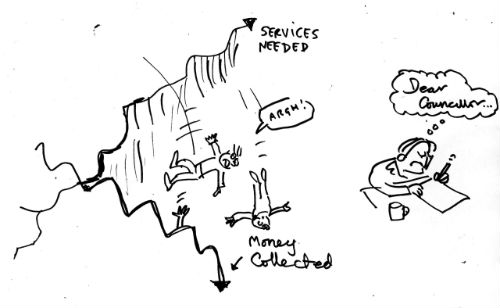





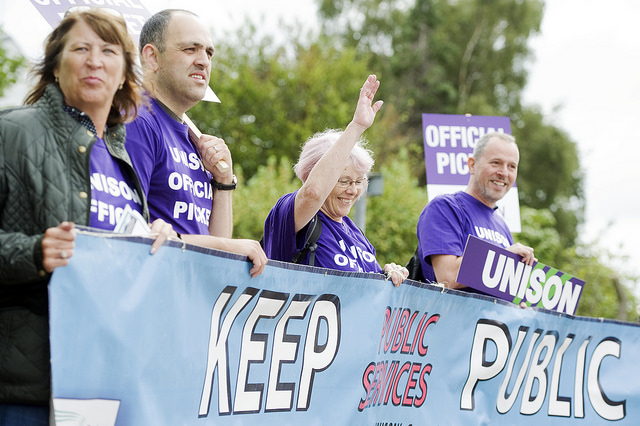 Background:
Background: